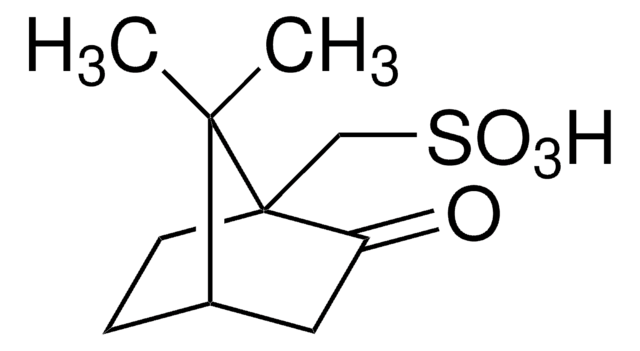556386
Polyaniline (emeraldine base)
average Mw ~50,000
Synonym(s):
Emeraldine base polyaniline
Sign Into View Organizational & Contract Pricing
All Photos(2)
About This Item
CAS Number:
MDL number:
UNSPSC Code:
12352103
PubChem Substance ID:
NACRES:
NA.23
Recommended Products
mol wt
average Mw ~50,000
Quality Level
solubility
m-cresol: soluble
DMAC: soluble
DMF: soluble
DMSO: soluble
NMP: soluble
λmax
~330 nm
InChI
1S/C3H4BrN3.ClH/c1-2-3(4)6-7-5-2;/h1H3,(H,5,6,7);1H
InChI key
LYCWKZFKTMHXQA-UHFFFAOYSA-N
Looking for similar products? Visit Product Comparison Guide
Related Categories
General description
Polyaniline (PAni) emeraldine salt can be prepared by protonation of PAni emeraldine base (PAni-EB). PAni-EB forms at pH>7. Its mechanism against corrosive agents has been explained in a study.
Application
PAni-EB may be used as a substrate for graphene transfer.
Features and Benefits
Undoped form of conducting polymer (non-conductive).
Storage Class Code
11 - Combustible Solids
WGK
WGK 3
Flash Point(F)
Not applicable
Flash Point(C)
Not applicable
Personal Protective Equipment
dust mask type N95 (US), Eyeshields, Gloves
Choose from one of the most recent versions:
Already Own This Product?
Find documentation for the products that you have recently purchased in the Document Library.
Customers Also Viewed
Annealing free, clean graphene transfer using alternative polymer scaffolds.
Wood JD, et al.
Nanotechnology, 26(5) (2015)
Study of epoxy and alkyd coatings modified with emeraldine base form of polyaniline.
Armelin E, et al.
Progress in Organic Coatings, 58, 316-322 (2007)
Jia Liu et al.
Science (New York, N.Y.), 367(6484), 1372-1376 (2020-03-21)
The structural and functional complexity of multicellular biological systems, such as the brain, are beyond the reach of human design or assembly capabilities. Cells in living organisms may be recruited to construct synthetic materials or structures if treated as anatomically
Our team of scientists has experience in all areas of research including Life Science, Material Science, Chemical Synthesis, Chromatography, Analytical and many others.
Contact Technical Service
